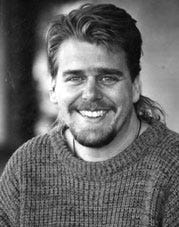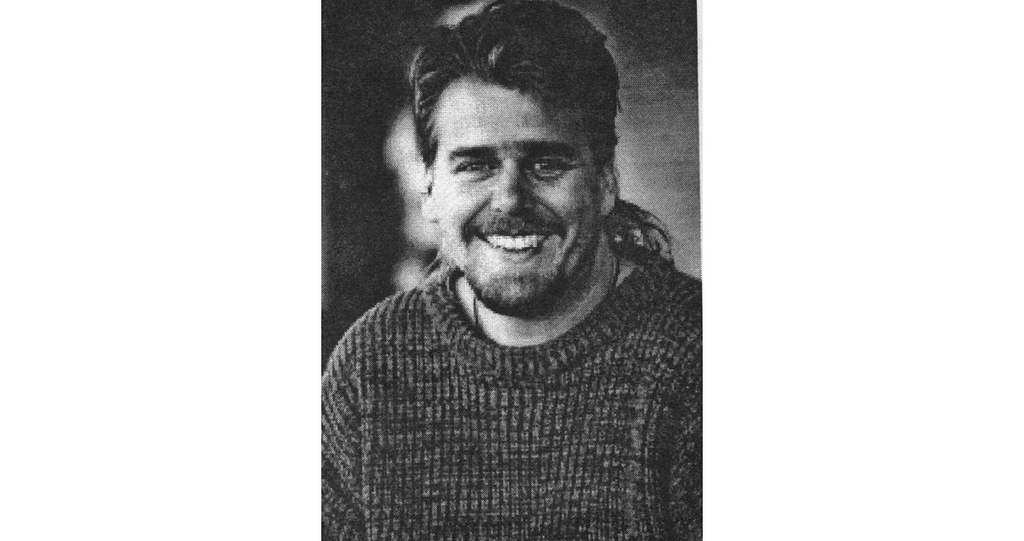Dewey was my Dumbledore
One of the most iconic moments in many of my favorite stories is when a young hero meets a mysterious wizard, and the wizard takes the hero under his wing and acts as his shepherd in a strange new world. Bilbo had Gandalf. Luke had Obiwan. Harry had Dumbledore. And I had Dewey Winburne.

I met Dewey the summer of 1994. I don’t remember how exactly, but I was recruited with a dozen other high-school-aged geeks to participate in a technology exhibition for the Texas Legislature. The organizers dropped us off at a warehouse in downtown Austin and gave us free reign in the most cutting edge lab of computer tech I could imagine. AV Macs. CD-ROM and laserdisc drives. Tons of video cameras and editing equipment. And a brand-new T1 line to the Internet.
Our assignment was to make as much cool stuff as we could, like a science fair a hackathon, or going to space camp. Not only was the building full of tech that we’d only read about in magazines, but also new stuff we’d never even heard of. I saw NCSA Mosaic for the first time, and was making my own HTML pages and GIFs later the same day. For context — the graphical World Wide Web had just been invented.
It was much like Harry Potter visiting Diagon Alley for the first time.
There were teenagers flitting all over the place, looking for new toys to try out, and sharing their discoveries with each other in real-time. Of the handful of adults there, I don’t remember too much about them, other than a judge of sorts coming around to pick projects to show the lawmakers at the end of the camp. And when the time came, the building was full of suits and people that looked at us like we were speaking a foreign language when we described what we were making.
But there was this one guy coming and going that stuck out… instead of wearing a suit he looked like he belonged in a rock band. My first impression was that he was a filmmaker or a musician, there to use the equipment to execute his creative vision. That turned out to be half true. This was Dewey Winburne, and he ran this lab at the American Institute for Learning as part of an alternative high school in Austin, TX.
Dewey’s recent work at the time was an interactive film, like a choose-your-own-adventure movie, that taught kids about peer pressure, addiction, and the road to recovery. It was cutting edge stuff with a message and bite. People took notice, and the project had recently won an Invision Award. This was pretty much the Oscars of interactive media at the time, which made him something of a rock star in our industry.
My initial week at the lab was a magical experience, and after having the absolutely most cutting-edge technology I could imagine at my fingertips… there was NO WAY that I was about to return to high school and just pretend that this hadn’t happened. I now knew there was a wizarding world just past the veil of my muggle existence… and there was no going back.
So before they’d dismissed us, I introduced myself to Dewey and asked him if there was any way I could come back and visit. “Of course,” he said. I asked if I could bring a friend. “Of course.” I asked if we could borrow some of the video equipment to make our own games and short films. “Of course.” And after a couple visits and conversations, I asked Dewey if my friend and I could have an internship, and come spend a good chunk of our day with him at the lab. “Of course,” he said again. So in the fall, my good pal Luis Borromeo and I started reporting to the lab instead of our high school.
We were absolutely blown away by Dewey. Not only did he talk with us and treat us like normal people (dare I say “like adults”), but when dealing with Dewey, anything was possible. As high school kids, we’d been dreaming about the notion that someday we could make video games or movies of our own. To have someone who’d done it not only say “yeah you can totally do that,” but for him to also give us the tools and coaching that we needed, it was life changing.
Dewey was our Dumbledore. He welcomed us into Hogwarts, trusted us with powerful magic, and encouraged us to use it for good.
And much like Dumbledore, Dewey was elusive, mysterious, and sometimes frustrating. Some days he’d rush in and get us whipped into a frenzy about a potential new project that may or may not materialize. Other days he’d bring in some new piece of technology and let us try-it-out (to the point of practically breaking it). I remember having conversations about what felt like impossible goals, but then Dewey would say “make a list of what you need to pull it off.”
These were the early days of “multimedia” and “the web” and Austin was full of cool people doing cool work. Not only was Dewey cooking up new projects, but he was also helping co-found the SXSW Multimedia Festival. It’s hard to believe that this giant mega-conference we now know as SXSW Interactive was once just a track of panels at a music & film conference, and that this free-spirited hippie helped spur them on to take multimedia seriously.
Dewey was a force of will, and his can-do spirit and passion for community-building helped plant the seeds for the SXSW that we now know and love. While I never worked directly on SXSW stuff, I remember eavesdropping on meetings like I was hiding under an invisibility cloak in The Three Broomsticks, trying to hear what the real witches and wizards were talking about.
To stick with the Hogwarts analogy… around Dewey were amazing people doing their own great work, who acted as the Professors McGonagall, Flitwick, and Hagrid to us young wizards. They all had huge impact on us, and I’m just as grateful to them as I am to Dewey. The mentorship we received during our internship and in the years that followed was priceless. We didn’t really know it at the time, but we were hanging out with a special and select group of talented and magical people.
Dewey introduced us to practically everyone who came through to door, and to my absolute delight, introduced us as peers and potential collaborators. We were learning so much, not only about tech and media production, but also what it meant to work in a creative, collaborative office space. We were still in high school, and before the end of the semester we’d formed our own company working on projects for ourselves and other companies.
When our internship ended we saw Dewey less and less. He was busy hunting Horcruxes and fighting the forces of darkness. I’d bump into him at SXSW or a multimedia studio and catch up in fast, furious, excited bursts. Dewey always had amazing stories to share and the biggest goals and aspirations.
I eventually learned that Dewey’s attitude towards us wasn’t actually about us at all. It wasn’t that he saw something special in us and therefore decided to support us. We weren’t the chosen one like Harry Potter — Dewey simply believed in and supported everyone. If you were trying to do something and asked Dewey for advice, without fail, Dewey would turn around and introduce you to five like-minded people willing to help you make it happen.
Dewey believed in the transformational power of technology, and that with the right access and encouragement, anyone could accomplish great things. This was his mission and life’s work. Long before anyone was talking about the digital-divide or the one-percenters, Dewey was making software that directly helped improve people’s lives through education, training, and access.
And this is where the story takes a sad turn. Like my favorite wizards… Gandalf, Obiwan, and Dumbledore… Dewey Winburne died just as my story was getting started.
There’s no easy way to put it… I was devastated. Dewey’s death was a defining moment in my life. While I’ve been lucky to receive mentorship and guidance from many amazing people, none of them had the same concentrated impact that catapulted me from a student to bonafied professional as my time with Dewey Winburne. And I know that I’m not alone in saying this. When Dewey died, so many people shared similar stories about the doors that Dewey opened for them.
It’s now been twenty years since Dewey’s death. I’ve been able to live out so many of the dreams that were hatched back during my internship with him. I’ve started and sold companies, helped create award-winning virtual reality, traveled around the world for work and fun, and even done insane bucket-list stuff like making videogames for Marvel Comics. It’s hard to imagine what my life would be like if I hadn’t met Dewey, and if he hadn’t kept saying “of course” to all the crazy things I asked of him.
It is my deepest desire to help pass on Dewey’s legacy — by doing good work, connecting friends, sharing hard-learned lessons, and helping mentor others. I believe in the transformational power of technology, and in a world where some would use it as a force for evil, it’s more important than ever that we stick together and use it for good.
I don’t write or talk about Dewey much. It’s too personal and too painful. But I do want to pay him tribute. Dewey was complicated, imperfect, and entirely human. All the more reason that the Dumbledore analogy holds for me. I knew him as a boy. He died just as I was becoming a man. And I still love him for everything he did for me… and for everyone else.
I hope you have had a Dewey in your life too.

You can read more people’s stories about Dewey on the tribute site from 1999.